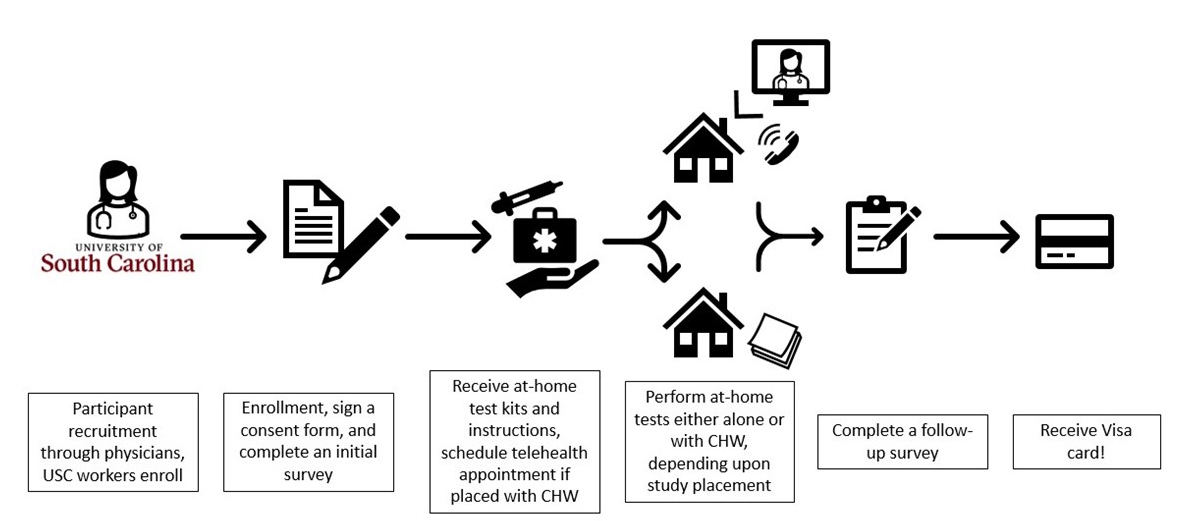Project Details
We hope to enroll people at risk for either diabetes or colorectal cancer.
The project goal is to determine the following:
- Whether individuals at high risk for diabetes / colorectal cancer would be likelier to get screened for these conditions if they could test at home
- Whether the inclusion of a community health worker through a telemedicine appointment increases testing confidence and follow-up care with their physician
Join us for Upcoming Events
At this time, we are not currently enrolling for study participation. If you have any questions about potential continuations or opportunities, please reach out to one of the provided contact methods.
¿Más preguntas?
Visite nuestra ventana de preguntas frecuentes para encontrar algunas respuestas.
If your question is not listed under the FAQs, please email our team at allinsc@sc.edu or call our project hotline at (803) 576-7378.
¡Gracias por su consideración!
Study Overview and Timeline
Where do I fall with the ITALIC project?
The self-testing portion of the Italic Project will 1) determine whether providing at-home tests increases the likelihood of screening completion, and 2) if the presence of a CHW via telemedicine increases test completion, confidence in test results, and follow-up care. We hope to enroll people at risk for either diabetes or colorectal cancer and recruit participants from our clinic partnerships as they attend an appointment for an unrelated issue. High-risk individuals for these conditions are typically Latino or Native American and older Black males. Beyond demographics, other high-risk factors may include a history of elevated A1c (without official diabetes diagnosis) or a family history of diabetes or colorectal cancer.
Pre-diabetes patients will be screened using the Kiss and Tell assay, a rapid and non-invasive saliva-based test which measures glucose levels within 5 minutes. Colorectal cancer will be screened using the Second Generation Fecal Immunochemical Test (FIT Test), and this is a rapid non-invasive fecal test to measure the presence of blood in the bowels within 5 minutes.
All participants will be provided two kits and instructions for test completion. Those assigned to test with a community health worker will be contacted to schedule a virtual appointment within one week of enrollment. All participants will be recruited from a clinic setting and will be referred to their original provider regardless of the testing assignment and the results for clinical management.
If you are recruited and choose to enroll,
- You will be given paper consent forms as well as an initial intake survey to complete and your placement in the study process will be determined. You will also be given the two at-home tests to be taken later and paper instructions to follow.
- If you are placed in the “assisted” cohort, you should schedule a telehealth appointment with one of our community health workers.
- Take the tests either on your own or with a CHW present during your scheduled telehealth appointment, depending on your cohort placement.
- Once your results have been received, complete a follow-up survey about your experience
- Complete a follow-up appointment with your clinician regardless of test result for health management

Study Overview and Timeline
Colorectal cancer – Fecal Immunochemical Test, FIT
- Fill out personal information on collection tube
- Have a bowel movement within 48 hours of telemedicine appointment, if assisted
- After a bowel movement, wipe normally with provided Bunny Wipe and collect a small sample of feces using the wand included with the collection tube
- Screw the collected sample into the collection tube and secure tightly
Diabetes – Kiss and Tell Assay
- Ensure you have not had anything to eat or drink within two hours of beginning the test
- Put the kiss and tell test wand into your mouth and wait five minutes, still in your mouth
- Record result based on color of screening
